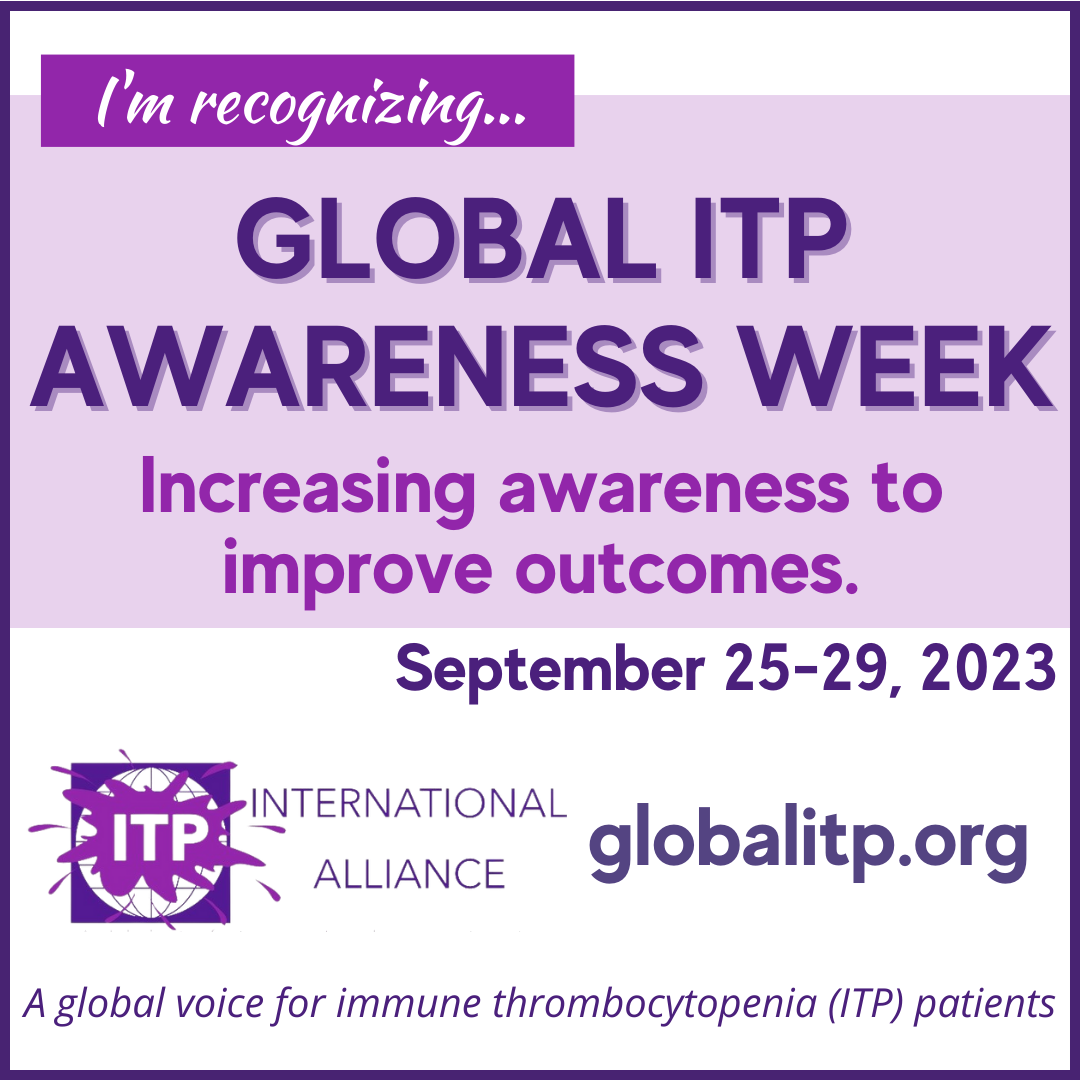Global Immune Thrombocytopenia (ITP) Awareness Week 2023
21 September 2023
September 25-29th 2023 is Global ITP Awareness Week!
This specially designated week calls for individuals around the world to join together to promote public awareness of a rare autoimmune disease called immune thrombocytopenia (ITP). The theme for this year’s Global ITP Awareness Week is Increasing Awareness to Improve Outcomes and we thank you in advance for helping us empower the global ITP patient community!
Please mark your calendar and help us bring attention and understanding to this rare bleeding disorder throughout the week.
Also help us to make a splash on Sport Purple for Platelets on September 29th.

ITP affects 9.5 in 100,000 people. In ITP the immune system attacks important blood cells (platelets) essential for normal blood clotting, resulting in reduced numbers of platelets and putting patients at risk of bleeding, which can occur to varying degrees. Persistent ITP lasts 3-12 months; chronic ITP lasts over a year. Treatment practices vary between different nations and local treating hospital sites within individual nations.
In the UK, patients with newly diagnosed disease are usually referred to haematology departments in hospitals for diagnosis, treatment (if needed), monitoring and follow up. For patients needing treatment, a course of corticosteroids (steroids – a man-made version of a hormone the body makes naturally) is usually recommended as the initial (first line) treatment.
Most of patients respond well to corticosteroids with a rise in platelet count, but improvements are usually temporary – in the majority of patients, the disease will return. Long-term use of these drugs can lead to side effects that can be serious and distressing to the patient, and some patients need further ‘rescue’ treatment or other medications or rarely an operation (splenectomy) to remove their spleen (an organ involved in the production and removal of blood cells).
For more information about ITP, please visit the ITP International Alliance website: Home (globalitp.org)
The Centre for Trials Research (CTR) at Cardiff University, Wales, UK is increasing national and international capacity in ITP and other blood disorder research through delivery of well-designed clinical trials and studies; the RODEX study being a prime example.
RODEX is an investigator-led commercially funded (Amgen) clinical trial developed and led by researchers at the Andalusian Public Foundation for Health Research Management of Seville (FISEVI), Spain through collaboration with the UK Chief Investigator Dr Charlotte Bradbury (Consultant Haematologist at University Hospitals Bristol and Weston NHS Trust Dr Charlotte Bradbury – Our People (bristol.ac.uk) and Senior Lecturer in Haematology at the Faculty of Translational Health Sciences, University of Bristol University Hospitals Bristol and Weston NHS Foundation Trust (UHBW NHS)). The CTR is acting as the UK National Coordinator to support study delivery in England, Wales and Scotland.
The trial aims to recruit 126 adult patients with newly diagnosed ITP; the objective being to find out if a two-drug combination of corticosteroids (dexamethasone) plus a medicine called romiplostim is better than dexamethasone alone in this patient group. The trial is already actively recruiting ITP patients in Spain and Italy and pending recruitment of the first UK participant in Autumn 2023. We hope that through this trial we can improve the outcome of future patients diagnosed with ITP.
Watch this link for updates on study progress! Studies and trials – Centre for Trials Research – Cardiff University
Please share this article on social media using #ImprovingOutcomesForITP, #global4ITP or #ITPaware
Please download the Global ITP Awareness Logo to display in your local community or workplace to help us raise awareness of this important rare condition.

- by Jo Smith, Trial Manager/Research Associate at the Centre for Trials Research, Cardiff, Wales, UK
- December 2025
- October 2025
- June 2025
- May 2025
- April 2025
- March 2025
- February 2025
- December 2024
- November 2024
- October 2024
- September 2024
- July 2024
- June 2024
- May 2024
- April 2024
- March 2024
- December 2023
- November 2023
- September 2023
- July 2023
- June 2023
- April 2023
- March 2023
- February 2023
- December 2022
- November 2022
- October 2022
- September 2022
- August 2022
- July 2022
- June 2022
- May 2022
- April 2022
- March 2022
- February 2022
- January 2022
- November 2021
- September 2021
- July 2021
- June 2021
- May 2021
- March 2021
- February 2021
- December 2020
- November 2020
- September 2020
- August 2020
- July 2020
- January 2020
- December 2019
- October 2019
- September 2019
- July 2019
- June 2019
- May 2019
- April 2019
- February 2019
- December 2018
- November 2018
- October 2018
- September 2018
- August 2018
- July 2018
- June 2018
- May 2018
- April 2018
- March 2018
- December 2017
- October 2017
- August 2017
- July 2017
- June 2017
- May 2017
- April 2017
- March 2017
- February 2017
- January 2017
- December 2016
- October 2016
- August 2016
- June 2016
- April 2016
- March 2016
- February 2016